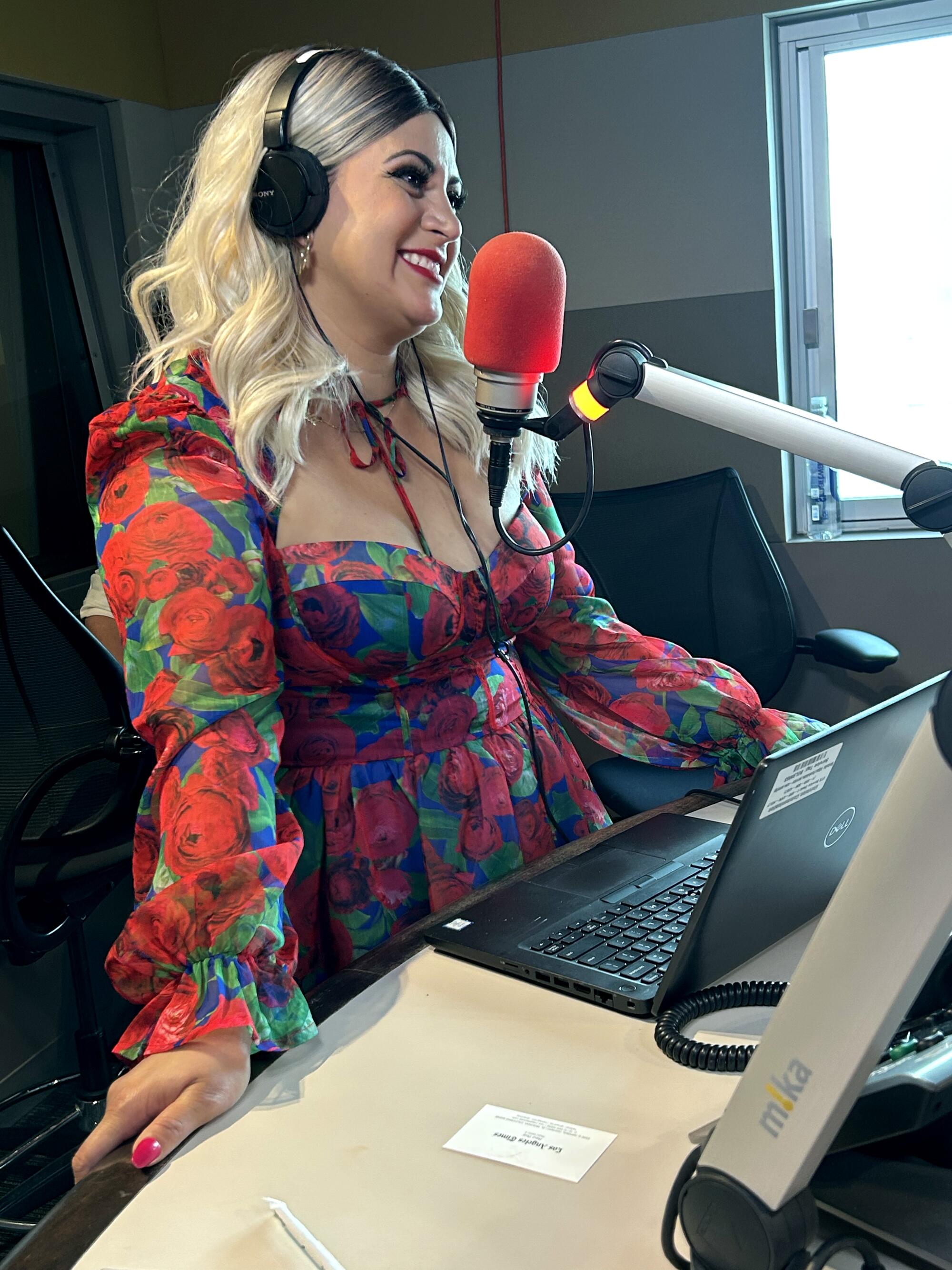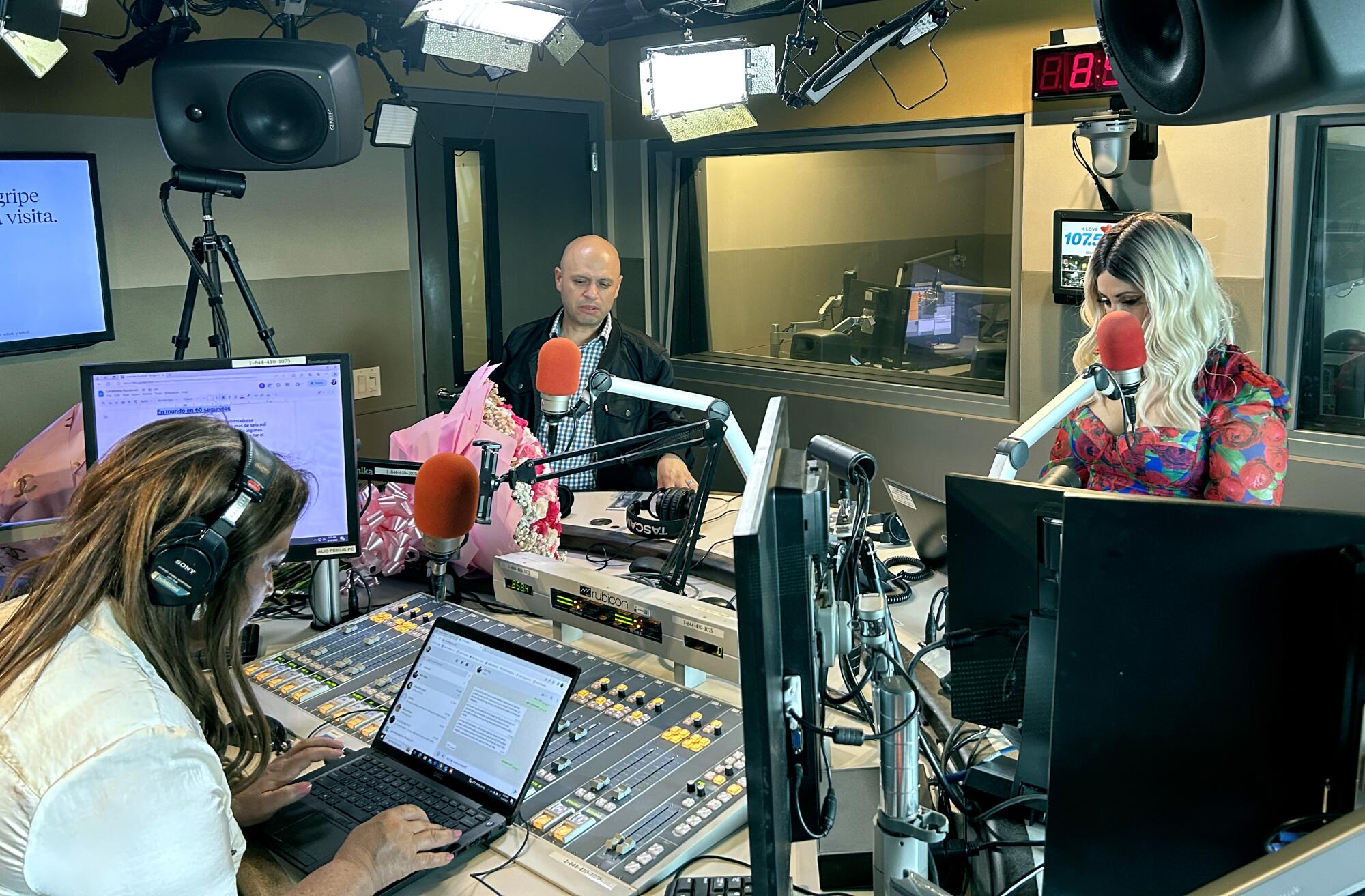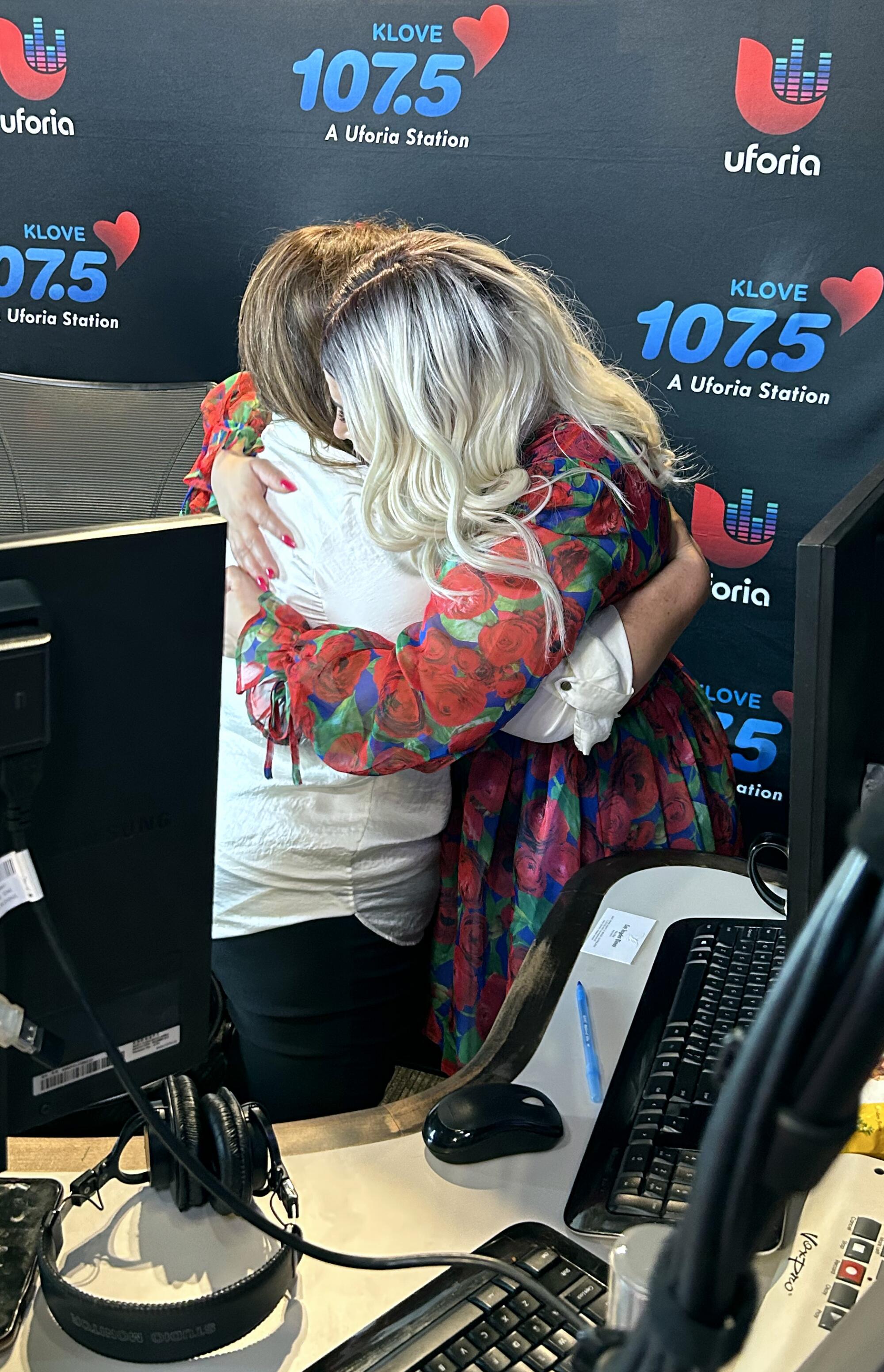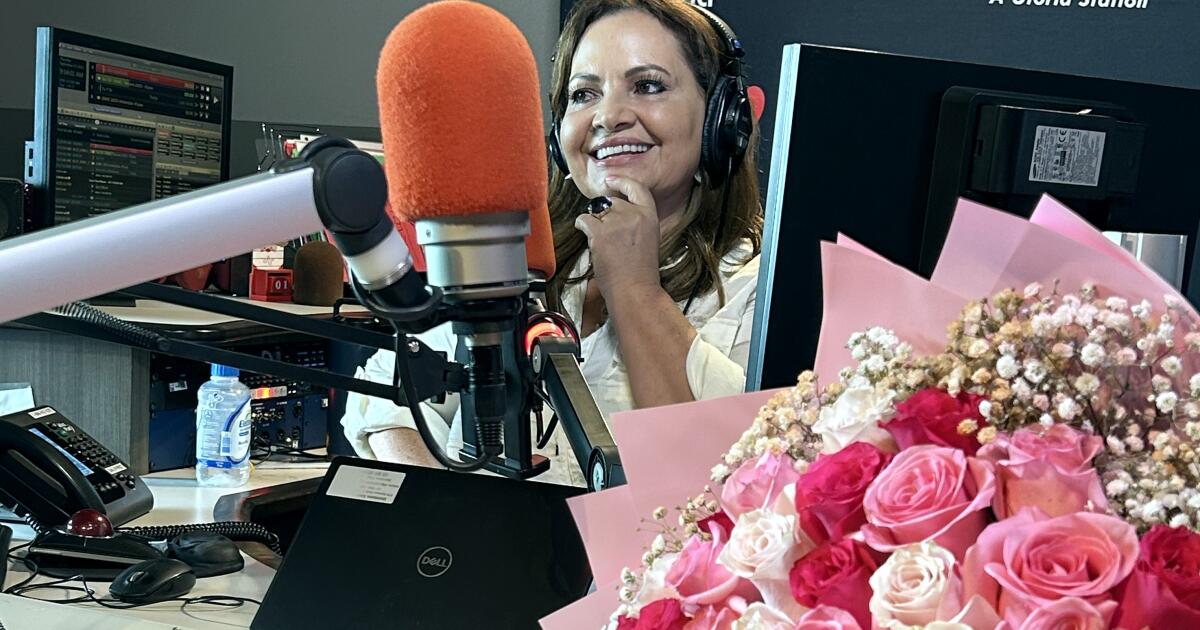When KLVE listeners woke up and tuned into L.A.’s oldest Spanish-language FM station on Sept. 14, they heard two voices as intimate as those of family members.
Those warm, welcoming voices belonged to María Elena Nava and Denise Reyes, who hit the airwaves of the syndicated morning show “Levantate” (Wake Up) with a variety of Spanish love songs, giveaways and congratulatory phone calls from listeners and family members.
Their debut was part of a sunrise rebranding effort by the radio station, which is part of the Uforia Audio Network. Nava switched to KLVE-FM (107.5) from FM sister station Recuerdo (103.9), while Reyes formerly worked an evening slot at KLVE (pronounced K-love). The show also airs in San Francisco, San Jose, San Diego, Fresno and Phoenix.
Fox Deportes personality and former radio host Carlos Alvarez thinks that, “with María’s return to KLVE, they have someone who knows their format very well, knows the radio listener and knows very well what they expect from KLVE in the morning.”
A steady flow of well-wishers greeted KLVE’s new morning co-hosts. Gigantic congratulatory floral arrangements filled the broadcast studio’s counter.
“I’ve waited three hours on hold to talk to you and congratulate you,” said a call-in listener named Salvador. “I’ve come from ‘Recuerdos’ and now we have to change radio stations at home, in the car and at work.”
“Levantate” co-hosts María Elena Nava, left, and Denise Reyes pose with gifts they received after finishing their first day on air together at radio station KLVE.
(Raul Roa / De Los)
Another listener named María said she also had followed Nava and Reyes to their new morning time slot.
“Denise has always been so happy and helpful while she worked at night,” María said in Spanish. “You are spectacular and the vibe is beautiful. You don’t know how much following you has helped me.”
María elaborated that when her mother passed away, Nava’s on-air words felt like they were for her personally. “May the Lord bless you both,” she concluded.
In an interview with the Los Angeles Times en Español, Nava said the show will be not only about helping listeners wake up happy and in good spirits, but also will include segments on personal growth and the news of the day. The radio format will continue to be “formato de musica romantica,” all ballads, whether they are “rancheras, gruperas or internacional,” Nava said, citing popular artists such as Luis Miguel, Christian Castro, Juan Gabriel and Vicente Fernández.
“Radio, like newspapers, have changed a lot since Nava’s career started,” said Kevin Baxter, a Los Angeles Times sports reporter who previously covered Spanish-language radio.
Nava “has had success across genres and stations,” Baxter continued. “She’s a familiar name to many, although the Spanish-language market, more so than English, tends to be younger and regenerates itself more frequently, meaning Nava also has to reintroduce herself.”
For Nava, the key to the show is authenticity and making it constantly relevant to listeners’ lives.
“This is what our listeners expect of us and this is the only thing we want to bring to them,” she said.
Nava and Reyes, who begin their five-hour show at 5 a.m. Monday through Friday, say their audience know they will find sympathetic listeners in the two women.
“Sometimes people go through difficult situations. We are here to lift them up and we will talk about resources, news and other things listeners need along with the excellent music we play,” Nava said.
Added Reyes: “I love that our filter is family-friendly. We talk about things the entire family can listen to and we will do it with love, care and from the bottom of our hearts.”

Denise Reyes moved to “Levantate” from KLVE’s evening show.
(Raul Roa / De Los)
The co-hosts also have an intuitive cultural understanding of their listeners, many of whom are immigrants from Mexico and other Latin American countries.
“I knew I wanted to be in radio and in communications in general when I was a little girl, probably 8 years old,” Nava said. “My family reminds me how I was rewriting radio or TV commercials, write them down and revoice them back in my hometown in Michoacán, Mexico.”
After high school, Nava studied broadcasting at Columbia College Hollywood, now called California College of ASU (Arizona State University).
“I took their two-year program. I went without my parents’ permission and I started working full time at a factory and studying at the same time,” Nava said.
“I got a call to do an audition at Metro Traffic Control just before I graduated from this school. They wanted to do a few new bilingual people to do traffic reports in English and Spanish. I got my job and there was no time for anything else. God really helped me along the way to find the right schools, the right teachers. The only Spanish stations I was doing traffic reports for were KLVE 107.5 FM and the sister station, 1020 AM. Back in the day, we didn’t have any other stations. I later auditioned for and became co-host with Humberto Luna, the most popular show at that time. He was looking for a female co-host and I got the job.”
TelevisaUnivision content director Mark Arias said the co-hosts were a shoe-in because of Nava’s experience as music director and show host. Nava also helped build the station’s popularity.
“She’s been in the market for so long, people know her everywhere,” he added.
“Everywhere I go with María, she has to stop and take pictures,” Arias continued. “The other night at a private show with Alejandro Fernandez, we couldn’t walk 5 feet without somebody saying ‘María Nava, María Nava.’”
Baxter said that “Nava’s return to KLVE, once the dominant station in Los Angeles, comes at a time when the station is trying to climb back up the ratings table. It trails five English-language stations and, in the last two summer Nielsen polls, was behind sister station KRCD as well.”
Baxter added that “Nava was definitely a trailblazer in the male-dominated world of Spanish-language radio when she took over as program manager of KSCA-FM (101.9) 25 years ago. At the time the major voices on Spanish-language radio belonged to men such as Pepe Baretto, Humberto Luna, Jaime Jarrin and Renan Almendariz Cuello.”
“Her success in taking that station to the top of the Nielsen charts, and the success of Martha Shalhoub as an on-air personality at KLVE, arguably changed the business,” Baxter said.
“She’s no doubt a pioneer in Spanish-language radio,” Baxter said. “She’s been able to reinvent herself numerous times, which radio demands. She’s in her late 50s though, which is unusual, I think, in that radio hosts tend to skew much younger. But her experience, both in radio and in life, and her Mexican heritage are big pluses in Southern California.”

“Levantate” co-hosts María Elena Nava, left, and Denise Reyes, right, talk with producer Robert Isaac.
(Raul Roa / De Los)
Reyes, who has held the No. 1 spot in evening ratings at KLVE, was perfect as co-host because “when we see that, we always try to grow from within the company,” Arias said.
“I don’t think there’s ever been two females hosting, usually one male and one female, but Denise just has this energy, super high energy, and the generations play a part. You have María with all the experience and you have Denise who is the up-and-comer doing very well with the ratings,” Arias added.
Baxter said: “Women, like men, will continue to follow the trends if they want to be successful.”
“Pio Ferro, who was program director at KLVE when Maria was at sister station KSCA, used to say his philosophy was to “play your favorite song, followed by your favorite song, followed by your favorite song,’” Baxter added. “But those favorite songs change.
“And as genres change, you have to change with them, but you also have to be careful not to tie yourself too closely to fads.”
In an email, Alvarez said that “time will tell, but I think the combination of María (mom, experience, formal) with the company of Denise (mischievous, outgoing, energetic) can work.”

María Elena Nava, left, and Denise Reyes hug after finishing their first day on air together at KLVE.
(Raul Roa / De Los)
This story originally appeared on LA Times

